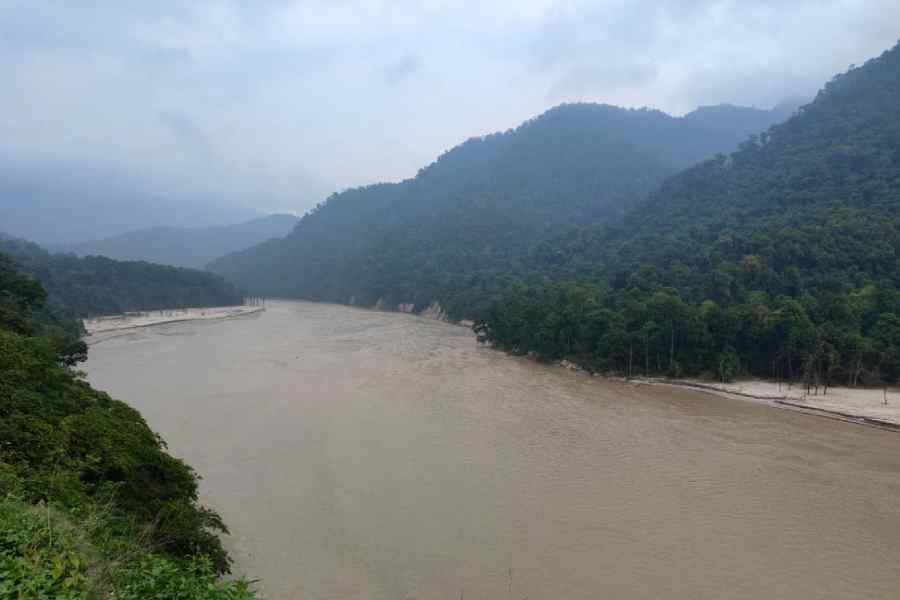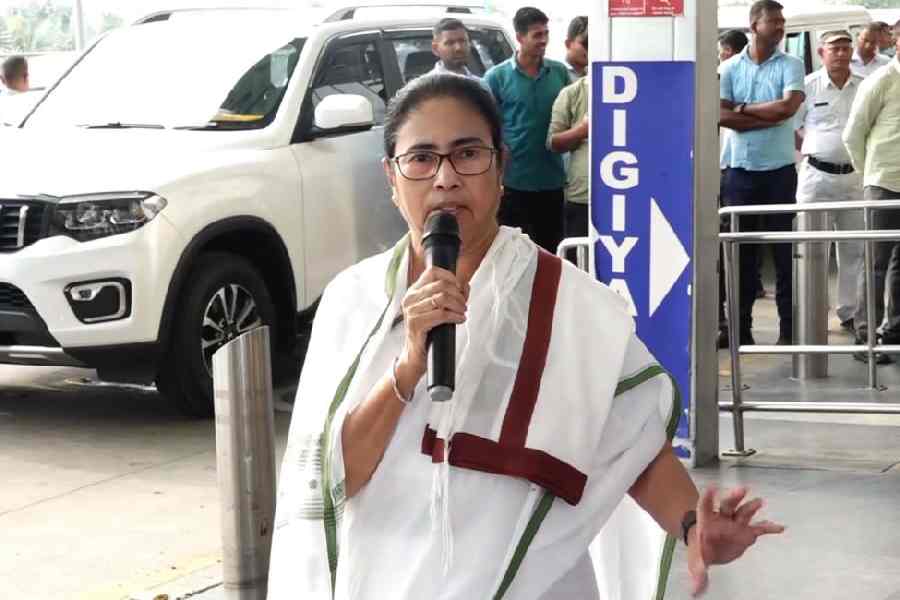Mamata Banerjee has written to Prime Minister Narendra Modi that it is “not feasible” to share the Teesta’s waters with Bangladesh, a position that strategic experts believe can derail New Delhi’s hydro-diplomacy with a Dhaka that is being courted by China.
The Bengal chief minister’s letter comes at a time India is trying to woo Bangladesh with the offer of “conservation and management” of the Teesta river system and a plan to renew the Ganges Water Treaty of 1996.
While this offer does not mention water-sharing, Mamata appears to have launched a pre-emptive strike.
“...Water flow in the Teesta has gone down over the years and it is estimated that, if any water is shared with Bangladesh, lakhs of people in North Bengal will get severely impacted due to inadequate availability of irrigation water,” Mamata’s letter, sent on Monday, says.
“In addition, Teesta water is also needed for meeting drinking water requirements of residents of North Bengal…. It is therefore not feasible to share Teesta water with Bangladesh.”

The Teesta river near Kalijhora. Picture by Passang Yolmo
Bangladesh has been waiting for a pact on sharing the Teesta’s waters since 2011, when Mamata scuttled a deal that was about to be signed during a Dhaka visit by then Prime Minister Manmohan Singh.
On Saturday, Modi and Bangladesh Prime Minister Sheikh Hasina met and discussed the entire range of bilateral cooperation, central to which was the sharing of the waters of common rivers.
The two countries share 54 rivers. Bangladesh, a lower riparian country, has been demanding a fair share of the waters of the Teesta, among others, to address water scarcity in its northwest.
While Dhaka’s patience running thin, China entered the scene around four years ago with a $1-billion multipurpose Teesta management project.
Ten days before her India visit, Hasina had told the Bangladesh parliament she was looking at the Chinese proposal, apparently sending India’s foreign ministry into a tizzy.
India’s subsequent offer of “conservation and management” of the Teesta and the promise to have a fresh look at the Ganges Treaty were, therefore, seen as a hurried response to stymie China in the game of hydro-diplomacy.
Mamata is also against a renewal of the Ganges Treaty, which relates to the flow of the Ganga’s waters into Bangladesh from Farakka and is to expire in 2026.
Her letter, sources in both countries said, might “derail” New Delhi’s plans.
“People in Bangladesh know the Indian government cannot move on river issues as water is a state subject. So, it seems India’s hydro-diplomacy plans with Bangladesh have been derailed, at least for now,” a source in Dhaka said.
Probably aware that her stance on the Teesta and the Ganga would not go down well in Bangladesh, where she enjoys wide popularity because of her anti-BJP politics, Mamata took care to underscore Bengal’s geographical, cultural and economic ties with the neighbouring country.
“However, water is very precious and is the lifeline of the people,” she wrote, explaining why she cannot compromise on the matter.
In her letter, Mamata described the Modi-Hasina discussions on the Teesta and the Ganga as “unilateral deliberations”, adding that these were “neither acceptable nor desirable” as the state was not consulted. Later, she told a meeting in Nabanna that she had sent a “strong” letter to Modi on the subject. She threatened a movement if the Centre went ahead without taking her government into confidence.
“The Centre is selling the water of Bengal,” Mamata said. “They are planning to renew the Ganga water-sharing treaty but didn’t inform us. Earlier, there used to be tripartite meetings (with Bengal’s representatives present) but now, they have simply bypassed Bengal.”
In her letter and at the Nabanna meeting, the chief minister accused the Centre of failing to keep its promise of tackling erosion by the Ganga, a big worry in the Malda and Murshidabad districts.
Mamata also recorded her reservations about the 14-odd hydropower projects on the Teesta in Sikkim – the mountain state from where the river originates – which has apparently led to water shortage downstream.
Sources in the policy establishment in Dhaka told this newspaper they were watching out for any Centre-Bengal standoff on the subject but added that it was not right to comment on “India’s internal political matter”.
Citing the recent rise in anti-India sentiments in Bangladesh, a strategic affairs expert said the development would reinforce the trend.
“Don’t forget history; remember how Tamil Nadu’s short-sighted policies on Sri Lanka and the Centre’s inaction helped deliver Colombo into the lap of Beijing,” the expert said, hinting at the possibility of a bigger Chinese role in Bangladesh matters.
Hasina is scheduled to visit China in the second week of July, and the trip’s outcome will be keenly watched, an Indian source said.
As Mamata was addressing a meeting with officials, there was no scope to ask her about China. But the dragon still made its way into the discussion, courtesy Mamata’s reference to water scarcity in South Dinajpur because of a reduced flow in the Atreyee, a river from Bangladesh.
“With the help of China, Bangladesh has built a dam on the Atreyee and people in the district are facing a water crisis. I wrote to the central government several times but no initiative was taken,” Mamata said.











